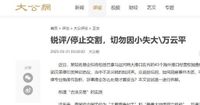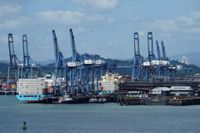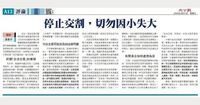In a move that has sparked intense debate and dissatisfaction among Chinese authorities, Hong Kong-based Cheung Kong Holdings has announced its plan to sell its equity in key Panama ports, including those vital to global trade routes, to a consortium led by the U.S. investment firm BlackRock for approximately $228 million. This sale, highlighted in a March 21 commentary by Ta Kung Pao, has been framed as a potential violation of legal principles established under Hong Kong law which prioritize national sovereignty and security.
The Hong Kong law in question explicitly states that the highest principle of the 'One Country, Two Systems' policy is to safeguard national sovereignty, security, and developmental interests. The commentary argues that allowing a significant asset in the Panama Canal—responsible for about 6% of global trade—to pass to a foreign entity could result in dire ramifications for China's economic interests and compromise its position in international trade.
According to the commentary, the planned transaction goes beyond ordinary commercial dealings. It suggests that the sale aligns precisely with U.S. strategies intended to contain China's growth, raising concerns that the deal could lead to increased logistics costs for Chinese businesses and ultimately reduce their competitiveness in the global market. The commentary warns that such a move could threaten the long-term viability of China's manufacturing sector and disrupt the ambitious Belt and Road Initiative, which aims to enhance trade connections between China and countries along the ancient Silk Road.
Cheung Kong and Hutchison, under the leadership of prominent business magnate Li Ka-shing, have recently come under scrutiny from both government and media, as voices calling for a halt to the sale grow louder. The pro-establishment Ta Kung Pao has vehemently criticized the transaction, emphasizing that any legal ramifications of the proposed sale should be considered seriously. The newspaper argues that ignoring the potential impact of the deal could lead to significant economic and strategic disadvantages for China.
In the opinion piece authored by Wan Yunping, it is stated, “The transaction not only appears to be an ordinary commercial act but is a perfect match for American strategies that aim to contain China.” This assertion underlines the belief that controlling such pivotal points in international trade routes could allow the U.S. to exert greater influence over global logistics and trade frameworks, further tightening its grip on China’s economic capabilities.
The risks of the transaction are deemed substantial. As indicated in the commentary, failure to halt the transaction might not only lead to a substantial increase in logistical expenses for mainland Chinese firms but could also diminish the robustness of their international supply chains. The article expresses that such outcomes are not mere speculation but are likely consequences of allowing foreign control over critical economic infrastructure.
Furthermore, the piece highlights the legal framework surrounding such transactions, arguing that any implications that suggest the deal should be treated as just a legal transaction operating under the freedom of contract are misguided. There are established legal mechanisms in place to counter operations that threaten national interests, reinforcing the argument that this deal could be detrimental to China's strategic goals.
Hong Kong has made strides toward reinforcing its legal system, ensuring that transactions that may endanger its sovereignty or national security are stringently regulated. The government has been vocal about adhering to legal norms, with officials asserting that any commercial dealings must align with set laws and policies.
The Ta Kung Pao commentary encapsulates the fears among many regarding the potential loss of crucial national assets to foreign entities, reminding stakeholders in such deals to be acutely aware of the broader implications of their business decisions. “Those emphasizing this transaction as merely a legal transaction might be overly naive,” the article cautions. There is a reiterated call to “stop the deal; do not lose big due to small gains,” urging Cheung Kong and other enterprises involved to reconsider the implications of this sale carefully.
In response to these critiques and the growing scrutiny, the Hong Kong government under Chief Executive John Lee has reassured the public that any transaction will be handled in compliance with the law. This affirmation reflects the government's commitment to monitor and ensure transactions do not undermine the region's legislative framework designed to protect national interests.
The outcome of this case is uncertain, but the implications span beyond mere financial transactions, tapping into deep-seated political and economic tensions between China and the U.S. As the situation progresses, the decision on whether to proceed with or halt the deal will undoubtedly be a focal point of discussion within both the business community in Hong Kong and on the political stage.
As global trade becomes increasingly intertwined with geopolitical dynamics, the scrutiny of such a significant decision reflects broader concerns regarding national security and economic sovereignty in an era fraught with international tensions.




